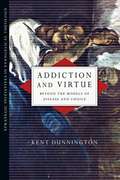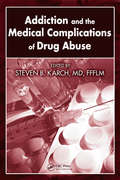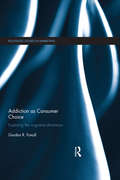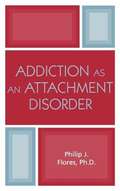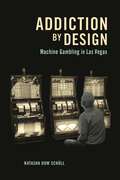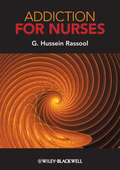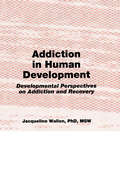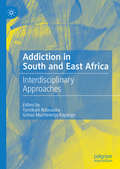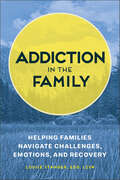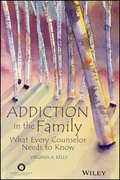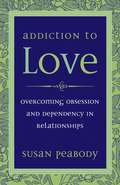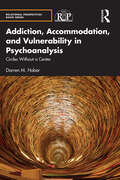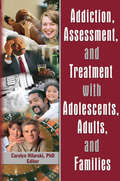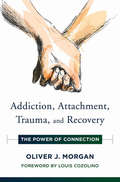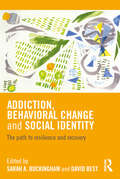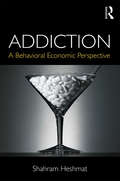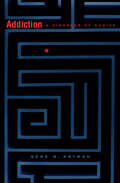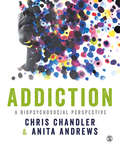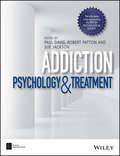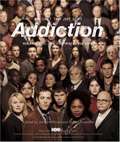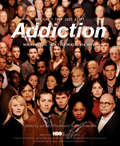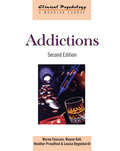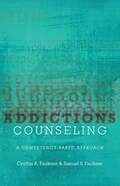- Table View
- List View
Addiction and Virtue: Beyond the Models of Disease and Choice
by Kent J. DunningtonWhat is addiction? Neither of the current dominant models (disease or choice) adequately accounts for the experience of those who are addicted or of those who are seeking to help them.
Addiction and the Medical Complications of Drug Abuse
by Steven B. KarchExtracted from the Drug Abuse Handbook, 2nd edition, to give you just the information you need at an affordable price.Addiction and the Medical Complications of Drug Abuse explores the physiological and psychological phenomenon of addiction including the nature of dependence, the dependence potential of drugs, and the i
Addiction as Consumer Choice: Exploring the Cognitive Dimension (Routledge Studies in Marketing)
by Gordon FoxallA striking characteristic of addictive behavior is the pursuit of immediate reward at the risk of longer-term detrimental outcomes. It is typically accompanied by the expression of a strong desire to cease from or at least control consumption that has such consequences, followed by lapse, further resolution, relapse, and so on. Understood in this way, addiction includes substance abuse as well as behavioral compulsions like excessive gambling or even uncontrollable shopping. Behavioral economics and neurophysiology provide well-worn paths to understanding this behavior and this book regards them as central components of this quest. However, the specific question it seeks to answer is, What part does cognition – the desires we pursue and the beliefs we have about how to accomplish them – play in explaining addictive behavior? The answer is sought in a methodology that indicates why and where cognitive explanation is necessary, the form it should take, and the outcomes of employing it to understand addiction. It applies the Behavioral Perspective Model (BPM) of consumer choice, a tried and tested theory of more routine consumption, ranging from everyday product and brand choice, through credit purchasing and environmental despoliation, to the more extreme aspects of consumption represented by compulsion and addiction. The book will advance debate among behavioral scientists, cognitive psychologists, and other professionals about the nature of economic and social behavior.
Addiction as an Attachment Disorder
by Philip J. FloresFrom the Foreword: "Addiction is a disorder in self-regulation. Individuals who become dependent on addictive substances cannot regulate their emotions, self-care, self-esteem, and relationships. In this monumental and illuminating text Philip Flores covers all the reasons why this is so. But it is the domain of interpersonal relations that he makes clear why individuals susceptible to substance use disorders (SUDs) are especially vulnerable. His emphasis on addiction as an attachment disorder is principally important because he provides extensive scholarly and clinical insights as to why certain vulnerable individuals so desperately need to substitute chemical solutions and connections for human ones. The strength of Flores's paradigm of addiction as an attachment disorder is that it is a theory that effectively and wisely guides treatment, but at the same time, when properly implemented or practiced, the treatment resonates with and further enhances the theory. Flores's work here is an extraordinary one because, in parsimonious and clear language, he makes a major contribution to the literature and practice of effective psychotherapy in general and effective psychotherapy for the addictions in particular. He fills in all the gaps between theory and practice covering wide and ranging issues of what practice and empirical findings have to teach about the critical ingredients of AA, group therapy, and individual psychotherapy. This is a job well done because it helps students and experienced clinicians alike to always be mindful of how they bring their humanity to the distress and suffering of others. His theory of addiction as an attachment disorder makes it particularly clear how especially important this is for those suffering with addictive disorders. " —Edward J. Khantzian, M.D., clinical professor of psychiatry, Harvard Medical School
Addiction by Design: Machine Gambling in Las Vegas
by Natasha Dow SchüllAn anthropologist looks at the new "crack cocaine" of high-tech gamblingRecent decades have seen a dramatic shift away from social forms of gambling played around roulette wheels and card tables to solitary gambling at electronic terminals. Slot machines, revamped by ever more compelling digital and video technology, have unseated traditional casino games as the gambling industry's revenue mainstay. Addiction by Design takes readers into the intriguing world of machine gambling, an increasingly popular and absorbing form of play that blurs the line between human and machine, compulsion and control, risk and reward.Drawing on fifteen years of field research in Las Vegas, anthropologist Natasha Dow Schüll shows how the mechanical rhythm of electronic gambling pulls players into a trancelike state they call the "machine zone," in which daily worries, social demands, and even bodily awareness fade away. Once in the zone, gambling addicts play not to win but simply to keep playing, for as long as possible—even at the cost of physical and economic exhaustion. In continuous machine play, gamblers seek to lose themselves while the gambling industry seeks profit. Schüll describes the strategic calculations behind game algorithms and machine ergonomics, casino architecture and "ambience management," player tracking and cash access systems—all designed to meet the market's desire for maximum "time on device." Her account moves from casino floors into gamblers' everyday lives, from gambling industry conventions and Gamblers Anonymous meetings to regulatory debates over whether addiction to gambling machines stems from the consumer, the product, or the interplay between the two.Addiction by Design is a compelling inquiry into the intensifying traffic between people and machines of chance, offering clues to some of the broader anxieties and predicaments of contemporary life. At stake in Schüll's account of the intensifying traffic between people and machines of chance is a blurring of the line between design and experience, profit and loss, control and compulsion.
Addiction for Nurses
by G. Hussein RassoolNurses are acknowledged as key agents in addressing alcohol and drug misuse at individual, family, and community levels. Addiction nursing is central to the assessment, management, and care of people with problematic use of psychoactive substances (both legal and illegal). Work takes place in a wide range of settings, from traditional hospital clinics and wards to community locations such as police custody suites and needle exchange facilities. Addiction for Nurses is a comprehensive textbook for students, explaining the role of the nurse at each stage of intervention. Early chapters approach the subject from sociological, historical, and cultural perspectives, covering significant topics such as the nature of addiction, its social context, and addiction theory. The book then presents vital information about each of the main areas of addiction (nicotine, alcohol, opiates, cannabis, psychostimulants, and hallucinogens) with clinical and practical guidance on recognition, assessment, and treatment intervention strategies. Further chapters consider dealing with emergencies, blood-borne viruses, harm reduction, and work with specific client groups (for instance, black and ethnic minority communities, or those with special needs). This book is an essential resource for all those who come into contact with alcohol and drug misusers and for specialist addiction nurses preparing for practice in this complex and rewarding field.
Addiction in Human Development: Developmental Perspectives on Addiction and Recovery
by Bruce Carruth Jacqueline WallenFind fresh perspectives on the treatment of addictions and effective methods for helping recovering alcohol and drug abusers in this valuable book!Addiction in Human Development provides practical strategies based on theories of human development for working with clients recovering from alcoholism and drug addiction. An understanding of these theories will help therapists and addictions counselors recognize stages of recovery and better select appropriate interventions for every phase of treatment of addicted clients.Addiction in Human Development shows how a developmental perspective is particularly appropriate to the treatment of alcohol and substance abusers and the patterns involved in their addiction. Disruptions in clients’childhood or adolescent development, stemming from their own or a parent’s drug abuse, can influence their present recovery process. This informative book also describes the developmental course of addiction and provides tools designed to interrupt addictive patterns. In addition, stages in the developmental process of recovery are identified to help therapists select appropriate interventions.Some of the topics related to human development and addiction covered in this insightful volume include developmental deficits and developmental arrest in recovering clients, delayed reactions to sexual abuse and other childhood trauma, stages in recovery from alcoholism or drug addiction, developmental issues in the professional’s own life, and multi-problem families with a multigenerational history of substance abuse. Applying these developmental strategies to work with addicted individuals will significantly improve communication and rapport between helping professionals and recovering addicts and lead to more success in alcohol and drug addiction therapy.
Addiction in South and East Africa: Interdisciplinary Approaches
by Grivas Muchineripi Kayange Yamikani NdasaukaThis book explores both the existence and prevalence of addiction in South and East Africa, departing from traditional assumptions about addiction in the region. The authors employ an interdisciplinary approach to understand the actual prevalence of addiction and the forms it takes in South and East Africa. The book also addresses the perceptions and conceptualisation of addiction in the region, in addition to discussing specific issues related to drug and alcohol abuse and addiction, social media addiction, and sex addiction.
Addiction in the Family: Helping Families Navigate the Challenges, Emotions, and Recovery
by Louise StangerA practical and supportive guide for families struggling with addictionGet compassionate guidance that shows you how to navigate the unique challenges faced when a family member is suffering from a substance use disorder (SUD). Addiction in the Family helps you better understand what your loved one is going through while also offering realistic advice for approaching their addiction and how it affects your entire family.Drawing on Dr. Louise Stanger's years of experience as an SUD and family trauma clinician, Addiction in the Family allows you to take things at your own pace and concentrate on the areas where you need the most help. Whether it's finding ways to help your loved one, concentrating on your own self-care, or starting the healing and recovery journey, you'll find practical and thoughtful guidance.Addiction in the Family is:Family-focused—Get advice that addresses the dynamics and challenges of dealing with a partner, child, or other family member who is suffering from SUD.Practical and hopeful—Learn how to set boundaries, deal with strong emotions, and find addiction treatment options, as well as the best ways to communicate with a loved one compassionately and honestly.Filled with real-life examples—Realize that you aren't alone thanks to composite anecdotes—drawn from Dr. Louise's practice—that help you contextualize your experiences.Addiction in the Family will help you discover a measured and considerate way to approach a family member suffering from SUD.
Addiction in the Family: What Every Counselor Needs to Know
by Virginia A. KellyThis book identifies and addresses potential clinical issues for clients who have family members struggling with addiction, and offers concrete strategies for treatment. Viewing addiction as a family disease, Dr. Kelly explores the complex challenges faced by family members, examines the ways in which substance use disorders affect family dynamics, and discusses behaviors that help sustain recovery and create and maintain healthy relationships. A brief history of substance abuse is provided, as are the primary models of addiction and family theory. Chapters on codependency and the emotional, relational, and behavioral consequences of living with a family member with a substance use disorder follow. The universality of substance abuse is then examined along with specific ethnic and cultural differences. Family support group treatment options complete the text. Case conceptualization exercises that contain reflections, implications for the counselor, and discussion questions for application of the material are interspersed throughout the book to link theory to practice. *Requests for digital versions from the ACA can be found on wiley.com. *To request print copies, please visit the ACA website here. *Reproduction requests for material from books published by ACA should be directed to permissions@counseling.org.
Addiction to Love: Overcoming Obsession and Dependency in Relationships
by Susan PeabodyLove addiction manifests in many forms, from Fatal Attraction-type obsessive lust to less extreme but nonetheless psychologically and emotionally harmful forms. The most common of these is staying in a bad relationship because of a fear of being alone-the "I hate you but don'¬?t leave me" relationship. In ADDICTION TO LOVE, recovering love addict Susan Peabody explains the variety of ways this disorder plays out, from the obsessively doting love addict to the addict who can'¬?t disentangle from an unfulfilling, dead-end relationship. Peabody provides an in-depth and easy-to-follow recovery program for those suffering from this unhealthy and often dangerous addiction and explains how to create a loving, safe, and fulfilling relationship.A seminal work on unhealthy and obsessive behaviors in love, and how to change behavior to have a positive relationship. This third edition includes a new introduction and revisions to the text throughout.Some symptoms of love addiction include love at first sight, excessive fantasizing, abnormal jealousy, nagging, and accepting dishonesty.Even relationships with parents, children, siblings, or friends may be addictive-dependency is not always related to romantic love.Previous editions have sold more than 40,000 copies."Love addiction is a three-headed serpent that Susan Peabody adeptly slays. This is the quintessential book for any love addict or counselor needing to fully understand this highly prevalent and complex disorder. Susan detects and dissects aspects of this condition not comprehended in other books of its kind. Recovery is possible. This book makes it possible to take the succinct steps necessary toward a loving and reciprocal long-term intimate relationship."-Sudi Scull, M.F.T., C.N., psychotherapist and nutritionistFrom the Trade Paperback edition.
Addiction, Accommodation, and Vulnerability in Psychoanalysis: Circles without a Center (Relational Perspectives Book Series)
by Darren HaberThis book explores the compulsions and trauma that underlie addiction, using an intersubjective approach in seeking to understand the inspirations and challenges arising from the psychoanalytic treatment of addiction, compulsivity, and related dissociative conditions. Drawing on insights from his own analytic practice and personal experience, in addition to the work of Stolorow, Brandchaft and Winnicott, among others, Haber considers the complex ways in which addiction becomes woven into a person’s life, and analyses how it interacts with other problems such as depression and anxiety, self-fragmentation, and ambivalence about treatment. Haber creatively integrates the work of Camus, Kafka, and Beckett to further contemplate the dilemmas that can arise during the clinical process and, in identifying his own and his patients’ vulnerabilities and contradictions, provides an honest, humorous and sometimes painful account of what happens in the consulting room. With its use of rich clinical material and an accessible and vivid writing style, this book will appeal to all psychoanalysts and psychotherapists working with patients affected by addiction, as well as other professionals seeking new insights into effective strategies for treating this most challenging malady.
Addiction, Assessment, and Treatment with Adolescents, Adults, and Families
by M. Carolyn HilarskiTime-effective intervention and prevention tools for dealing with addictionAddiction, Assessment, and Treatment with Adolescents, Adults, and Families examines addiction concerns ranging from prevention to relapse, offering effective intervention techniques and assessment tools to ensure delivery of the best possible service to clients who represent a variety of populations and mental health issues. Leading addiction researchers address new developments in theory, methodology, treatment, and assessment on counselor beliefs, contingency management, group treatment, rapid assessment instruments, behavioral couples therapy (BCT), family-based intervention, motivational interviewing, and 12-step programs and faith-based recovery. This essential professional and academic resource presents case studies, reviews, research findings, and empirical papers that offer unique perspectives on a variety of topics, including evidenced-based practice, theory of reasoned action, harm reduction, juvenile justice, and treatment outcomes.Addiction, Assessment, and Treatment with Adolescents, Adults, and Families presents sophisticated, cutting-edge theory and practice concepts that provide professionals, practitioners, and educators with a more varied focus than most current available books on addiction. Counselors working in mental health settings and EAP programs, psychiatric nurses working in hospitals and outpatient settings, social workers, and students pursuing degrees in social work, nursing, psychology, and criminal justice will benefit from the book&’s wide range of appropriate addiction, treatment, and prevention methodologies.Topics addressed in Addiction, Assessment, and Treatment with Adolescents, Adults, and Families include: understanding the gap between research and practice in substance abuse counseling prevalence and patterns of illicit drug use among juvenile offenders the relationship between the reported substance abuse of African-American and Hispanic youth and their perceived attachments with their primary caregivers using a harm reduction approach to the evaluation of treatment outcomes using a nonconfrontational approach to substance abuse counseling when addressing client denial why contingency management interventions are underutilized, especially in community settings how to determine if and when Motivational Interviewing (MI) and Adapted Motivational Interviewing (AMI) are effective how to use nonabstinence-based prevention services in working with adolescents how to use and score the K6 scale to screen serious mental illnesses how to use Receiver Operating Characteristics analysis to evaluate rapid assessment instrumentsAddiction, Assessment, and Treatment with Adolescents, Adults, and Families is a vital professional resource and an invaluable aid to adults, adolescents, and families of anyone suffering with some level of addiction.
Addiction, Attachment, Trauma and Recovery: The Power Of Connection (Norton Series on Interpersonal Neurobiology #0)
by Oliver J. MorganA new model of addiction that incorporates neurobiology, social relationships, and ecological systems. Understanding addiction is no longer just about understanding neurons or genes, broken brain functioning, learning, or faulty choices. Oliver J. Morgan provides a fresh take on addiction and recovery by presenting a more inclusive framework than traditional understanding. Cutting- edge work in attachment, interpersonal neurobiology, and trauma is integrated with ecological- systems thinking to provide a consilient and comprehensive picture of addiction. Humans are born into connection and require nourishing relationships for healthy living. Adversities, however, bring fragmentation and create the conditions for ill health. They create vulnerabilities. In order to cope, individuals can turn to alternatives, “substitute relationships” that ease the pain of disconnection. These can become addictions. Addiction, Attachment, Trauma, and Recovery presents a model, a method, and a mandate. This new focus calls for change in the established ways we think and behave about addiction and recovery. It reorients understanding and clinical practice for mental health and addiction counselors, psychologists, and social workers, as well as for addicts and those who love them.
Addiction, Behavioral Change and Social Identity: The path to resilience and recovery
by Sarah A. Buckingham and David BestChanging health-related behavior is for many people a lonely and isolating experience. Individual willpower is often not enough, particularly in addressing addictive behavior, but research increasingly points to the potential of group identity to shape behavior change and support recovery. This important collection explores the social and cognitive processes that enable people who join recovery groups to address their addictive issues. In an era of increasing concern at the long-term costs of chronic ill-health, the potential to leverage group identity to inspire resilience and recovery offers a timely and practical response. The book examines the theoretical foundations to a social identity approach in addressing behavior change across a range of contexts, including alcohol addiction, obesity and crime, while also examining topics such as the use of online forums to foster recovery. It will be essential reading for students, researchers and policy makers across health psychology and social care, as well as anyone interested in behavioral change and addiction recovery.
Addiction-Free Naturally: Free Yourself from Opioids, Pharmaceuticals, Alcohol, Tobacco, Caffeine, Sugar, and More
by Brigitte MarsA guide to designing a personal program to break your addictions safely, gently, and naturally • Shares herbs, supplements, natural remedies, and alternative practices that can help liberate you from habitual substance use, ease the withdrawal period, cleanse the body of toxins, and combat depression, anxiety, fatigue, and stress • Offers specific advice and remedies for individual addictive substances and behaviors, including sugar, caffeine, alcohol, opioids, tobacco, and tranquilizers • Explores the potential of psychedelic therapy for overcoming addiction and addresses how cannabis can be of benefit for recovery, without being misused Addiction affects more people than any other disease. Breaking a habit can be daunting--it&’s hard to know where to begin beyond quitting &“cold turkey.&” But just as habits can be acquired, they can be broken. Others have done it, and so can you! In this holistic guide to beating addiction, Brigitte Mars details how to replace negative habits and behaviors with positive healthy ones and safely support your body, mind, and spirit for a successful recovery. The author shares specific herbs, supplements, homeopathic remedies, flower essences, behavioral therapy, and alternative practices, such as meditation and yoga, that can help liberate you from habitual substance use and ease the withdrawal period as well as methods for cleansing the body of toxins and healthy ways to combat depression, anxiety, fatigue, and stress. She looks in depth at individual addictive substances and behaviors, including sugar, caffeine, alcohol, opioids, tobacco, and tranquilizers, offering specific advice and remedies for each. She shows how each technique can be used in conjunction with conventional therapies, such as psychotherapy, methadone, or Alcoholics Anonymous. Drawing on recent research, she also explores the enormous potential of psychedelic therapy for overcoming addiction and, with the spreading legalization of cannabis, she addresses how this plant can be of benefit for recovery, without being misused. Offering advice on designing a personal program to break your addictions, the author also shows how to use natural remedies to maintain your new energy and vitality as you walk the road to recovery.
Addiction: A Behavioral Economic Perspective
by Shahram HeshmatAddiction: A Behavioral Economic Perspective focuses on the behavioral economics of addiction to explain why someone decides and act against her own well-being. It answers the questions of what accounts for self-defeating behavior patterns and how do we best motivate individuals to act according with their long-term goals. A better understanding of decision processes will lead to an improved knowledge of why people engage in self-destructive behaviors and better policy interventions in areas of addiction and obesity. The approach also promises to be valuable as a framework for understanding decisions for an addict’s professional and business life. This book will be of particular use to clinicians, students, and researchers in the fields of addiction, public health, and behavior therapy.
Addiction: A Disorder of Choice
by Gene M. HeymanIn a book sure to inspire controversy, Gene Heyman argues that conventional wisdom about addiction—that it is a disease, a compulsion beyond conscious control—is wrong. Drawing on psychiatric epidemiology, addicts’ autobiographies, treatment studies, and advances in behavioral economics, Heyman makes a powerful case that addiction is voluntary. He shows that drug use, like all choices, is influenced by preferences and goals. But just as there are successful dieters, there are successful ex-addicts. In fact, addiction is the psychiatric disorder with the highest rate of recovery. But what ends an addiction? At the heart of Heyman’s analysis is a startling view of choice and motivation that applies to all choices, not just the choice to use drugs. The conditions that promote quitting a drug addiction include new information, cultural values, and, of course, the costs and benefits of further drug use. Most of us avoid becoming drug dependent, not because we are especially rational, but because we loathe the idea of being an addict. Heyman’s analysis of well-established but frequently ignored research leads to unexpected insights into how we make choices—from obesity to McMansionization—all rooted in our deep-seated tendency to consume too much of whatever we like best. As wealth increases and technology advances, the dilemma posed by addictive drugs spreads to new products. However, this remarkable and radical book points to a solution. If drug addicts typically beat addiction, then non-addicts can learn to control their natural tendency to take too much.
Addiction: A biopsychosocial perspective
by Dr Chris Chandler Ms Anita AndrewsAddiction: A biopsychosocial perspective provides students with an evidence-based approach to addiction whilst covering a broad range of topics, critical perspectives and influential theories in addiction. With chapters discussing key theories, psychological, biological and societal aspects of addiction, this is a highly accessible and essential resource for students and researchers that: Offers an evidence-based discussion of addiction Addresses the neuroscience and psychology of addiction Provides a critical account of the science and research in addiction Includes chapter overviews and summaries, learning aims and case studies to help students in their study
Addiction: A biopsychosocial perspective
by Dr Chris Chandler Ms Anita AndrewsAddiction: A biopsychosocial perspective provides students with an evidence-based approach to addiction whilst covering a broad range of topics, critical perspectives and influential theories in addiction. With chapters discussing key theories, psychological, biological and societal aspects of addiction, this is a highly accessible and essential resource for students and researchers that: Offers an evidence-based discussion of addiction Addresses the neuroscience and psychology of addiction Provides a critical account of the science and research in addiction Includes chapter overviews and summaries, learning aims and case studies to help students in their study
Addiction: Psychology and Treatment
by Paul Davis Sue Jackson Robert PattonAddiction: Psychology and Treatment brings together leading psychologists to provide a comprehensive overview of the psychology of addictions and their treatment across specialities and types of services. Emphasises the use of several approaches including CBT, psychodynamic and systemic and family treatments, and consideration of the wider picture of addictions As well as the theories, gives a clear overview of the application of these models Reflects the very latest developments in the role played by psychological perspectives and interventions in the recovery agenda for problem drug and alcohol users
Addiction: Why Can't They Just Stop ?
by David Sheff Katherine Ketcham Larkin Warren Katherine Eban Susan Froemke John HoffmanThis companion book to the HBO documentary of the same name sheds light on the hidden American epidemic of addiction and offers a comprehensive and provocative look at the impact of chemical dependency on addicts, their loved ones, society, and the economy.
Addiction: Why Can't They Just Stop?
by Susan Cheever Susan Froemke John Hoffman Sheila NevinsThis companion book to the HBO documentary of the same name sheds light on the hidden American epidemic of addiction. Blending compelling personal narratives with statistics and expert opinion, all gleaned from over two years of research and reporting, ADDICTION offers a comprehensive and provocative look at the impact of chemical dependency on addicts, their loved ones, society, and the economy. Breaking the stigma that addicts are simply weak and immoral, it delves into new brain research proving that drugs and alcohol change the chemical composition of addicts' brains, making it veritably impossible for them to quit. The nation's top experts persuasively argue that the time has come for the blame to stop and the healing to begin.ADDICTION also features material not included in the documentary: testimonials, original graphics and images, additional elaboration on theories and treatments of addiction, and more. Featuring a foreword by Sheila Nevins, the president of Documentary and Family Programming at HBO, an afterward by the best-selling author Susan Cheever, and the writing of David Sheff, this book is essential reading for anyone who has been impacted by what is now realized to be a very real and widespread disease.
Addictions (Clinical Psychology: A Modular Course)
by Wayne Hall Maree Teesson Heather Proudfoot Louisa DegenhardtThe first edition of Addictions established itself as a valuable resource for students and professionals alike. This authoritative new edition builds on the success of the previous book, incorporating advances in research and practice over the last ten years. The book includes material on: the nature of addiction and who becomes addicted health consequences of alcohol and other drug dependence theories and causes of addiction. The authors, experts in the field, also include new material on the controversy surrounding the possible positive effects of alcohol and cannabis use, the increased risk of interpersonal violence, and new research on theories of addiction. Addictions will be essential reading for students, professionals and researchers seeking state of the art information about this rapidly growing field.
Addictions Counseling: A Competency-based Approach
by Cynthia A. Faulkner Samuel FaulknerWritten by authors with extensive experience as practitioners and educators, this text serves as a straightforward resource for undergraduate and graduate students who have a goal of becoming counselors or therapists in the field of addiction. <p><p>While many books on the subject follow a similar format (i.e., introduction, classification of drugs, theories of counseling, etc.), Addictions Counseling takes one client and follows her through the entire treatment experience-from referral and assessment, all the way through relapse prevention and discharge planning. In following her through the treatment journey, readers are introduced to theories and techniques for approaching each of the topics discussed. This book is a must-read for anybody interested in pursuing a career as an addiction specialist.
